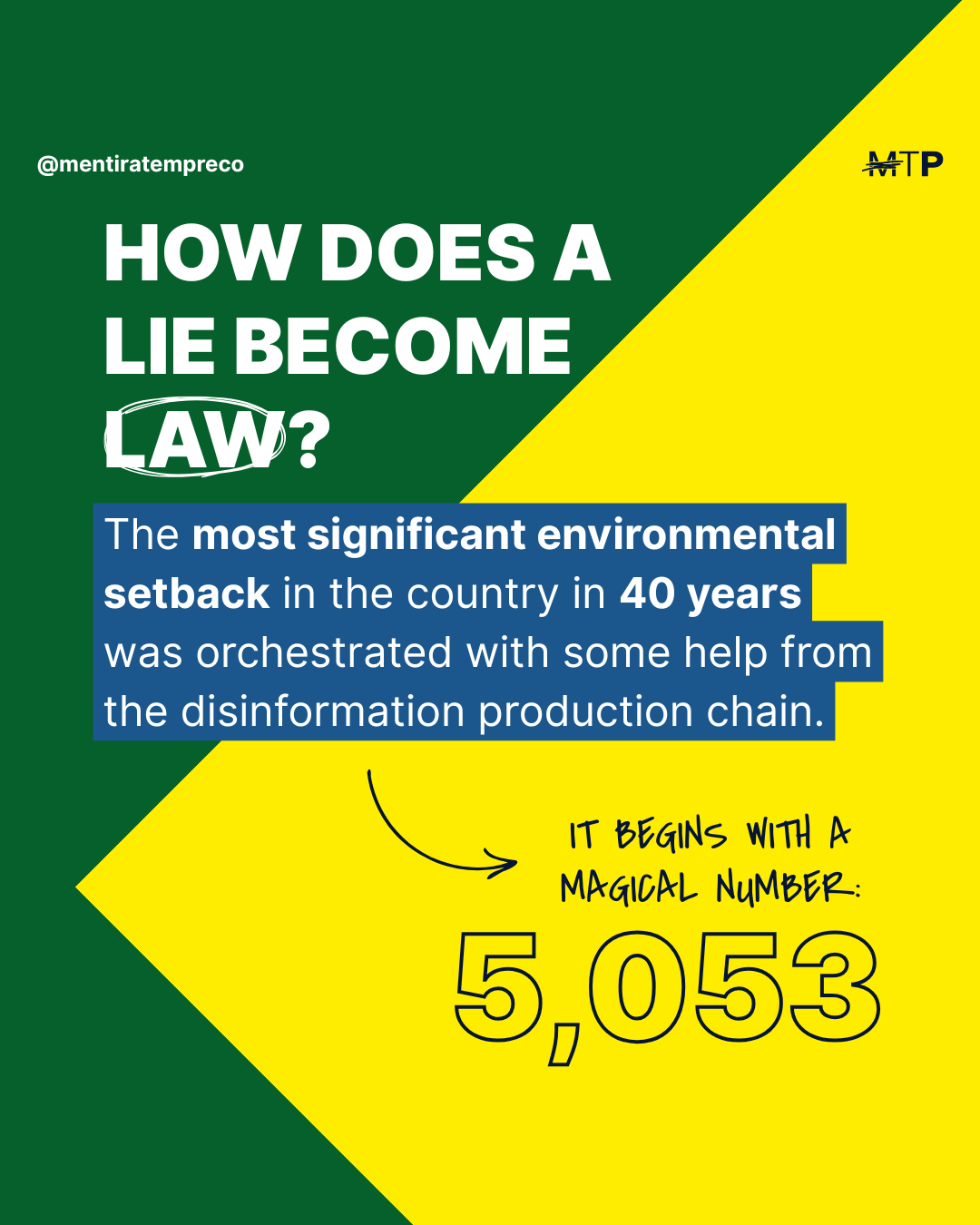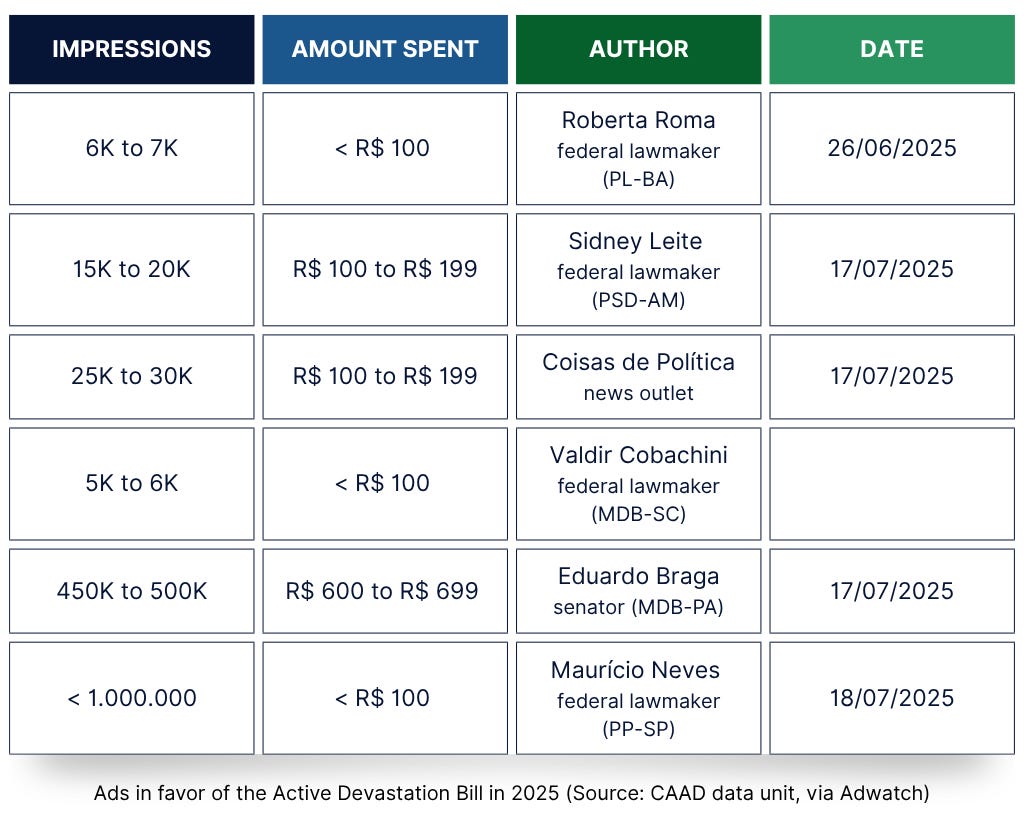How does a lie become law?
Information integrity: 1,383 mentions and how climate disinformation took center stage in the ‘Devastation Bill’, the most devastating environmental setback in Brazil since the return to democracy.
In previous editions of Oii (that you call 'o-double-i,' which we love)...
#2 ‘Shopee* Indigenous’ and Climate Disinformation
#3 Who profits from climate lies?
Let me tell you a little lie: the environment is the enemy of progress.
Sounds harmless, right? But this is the mother (it’s always the mothers, right?!) of all climate disinformation in Brazil. And it paved the way to the approval of PL 2159/2021 — better known as the PL da Devastação (the ‘Devastation Bill’) — the biggest blow to environmental protection in 40 years.
In the dead of night, on July 17 (Forest Protection Day, ironically), 267 members of congress voted yes to the 'Devastation Bill' (General Environmental Licensing Law), 116 voted no, and 167 were absent — all with the help of the disinformation machine which works 24/7 against the environment.
In a Congress that stays silent in the face of the climate crisis, neutrality isn’t enough. We need changemakers. Skipping the vote is choosing silence. And silence, in moments like this, is complicity.
The ‘Devastation Bill’ in four tweets:
Trust-based licensing:
simply swear that you are a good person and that you will not cause any negative impacts on an online form (yes, just like a Google form) and you will get your environmental licence. Renewals are automatic too.No questions asked:
13 agribusiness activities will now be exempt from licensing criteria in the name of “maintenance and improvements.” What counts as infrastructure improvements? Nobody knows…Environmental free-for-all:
states and cities now get to create their own exemption lists for handing out environmental licenses.Deforestation credit given the green light:
Banks that fund environmentally harmful businesses are now protected. This used to be illegal.
P.S. This bill removes assessments and oversight by environmental agencies.
P.P.S. There’s no transparency and no accountability… now what does this remind us of?
P.P.P.S. Flashback: isn’t this just like Brazil’s gold trade? Brazil is not for the faint of heart…
Enjoying it but not a subscriber yet?
Oii!?
Since when does repeating a lie 1,383 times make it true?
“5,000 projects are on hold in Brazil because of environmental licensing” — this was the internet’s favorite pro-‘Devastation Bill’ narrative, with 1,383 mentions. In this version of the story, transparency, oversight, and accountability are seen as obstacles to progress.
You read that right: this lie is being used to push an agenda and protect a privileged few. That’s why Oii shines a light on the supply chain of lies, because we can't create solutions for what we can't see.
Oii, the Observatory for Information Integrity - Climate and Environment, a partner of the international coalition Climate Action Against Disinformation (CAAD), is now publishing exclusive new data from CAAD’s research team.
Lawmakers cite the claim on social media that 5,000 projects are on hold due to environmental licensing. The problem? That number doesn't exist.
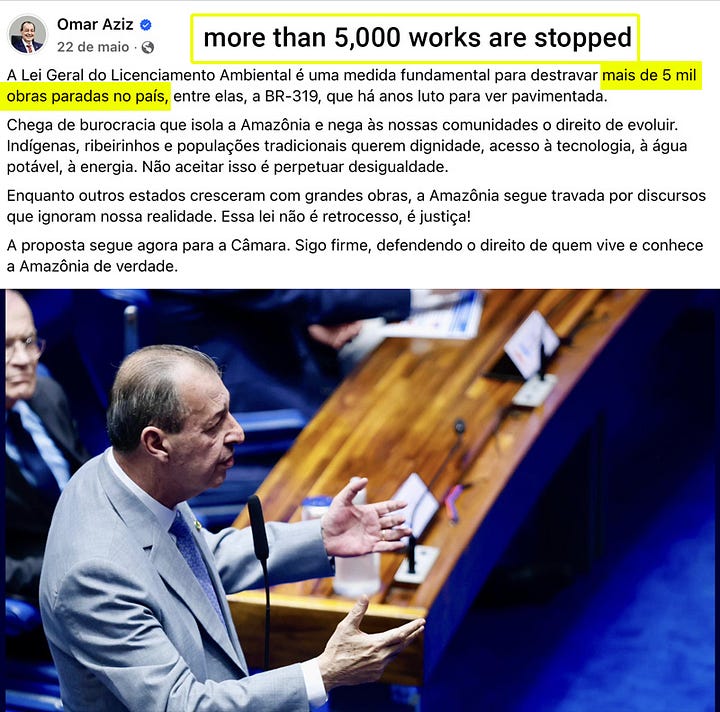
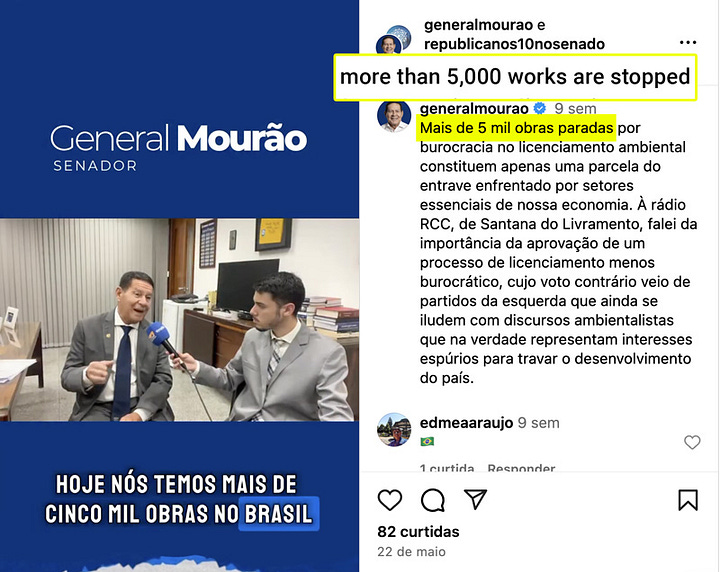
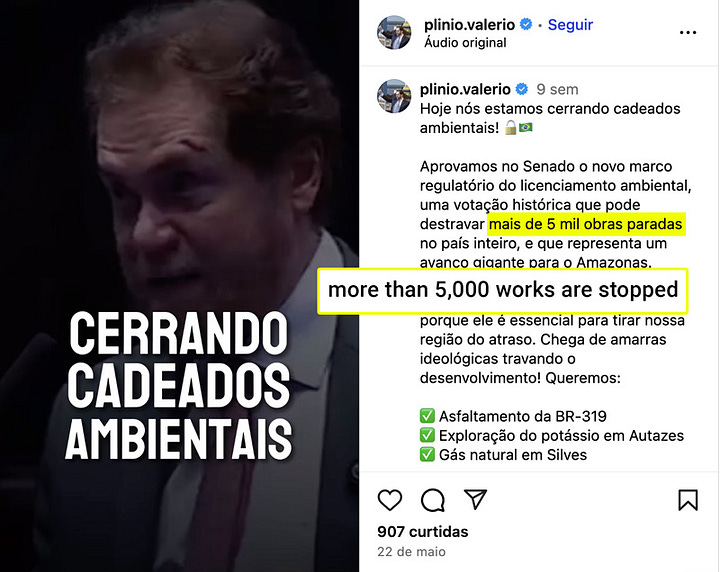
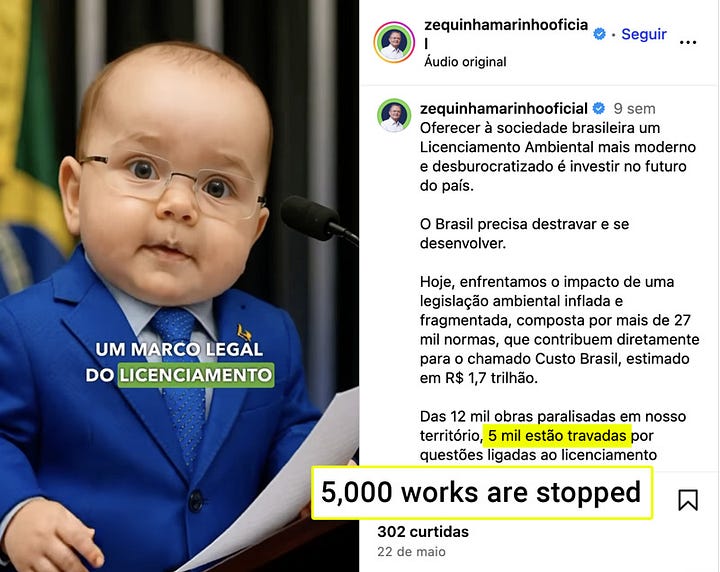
DATA SOURCE
CAAD Research Unit
TIMEFRAME
April to July 2025
SEARCH TERMS
Keywords related to the bill (e.g. “Devastation Bill,” “Environmental licensing,” “PL 2.159/2021,” and “PL2159”) combined with mentions of “5,000 projects” (such as “5 mil,” “5.000,” and “5.053” combined with “projects,” “developments,” or “works”)
TOOL
Brandwatch
PLATFORMS ANALYZED
Blogs, Facebook, Instagram, forums, YouTube, news sites, and X (formerly Twitter)
Liked it? Help us spark new conversations?
‘5,000 projects are on hold in Brazil due to issues with the current environmental licensing model? Senators Plínio Valério, Omar Aziz, Zequinha Marinho, and General Hamilton Mourão, along with other Brazilian politicians, have repeated this claim. The big issue: that information doesn’t exist anywhere. And who can we thank for uncovering this? Journalist Giovana Girardi from Agência Pública, who went after the truth of this story.
The office of Senator Tereza Cristina — the bill’s rapporteur in the Senate and Brazil’s former Minister of Agriculture, Livestock, and Supply (2019–2022) — who cited the figure in a plenary session in support of the bill, said the information came from a presentation by the Parliamentary Agricultural Front (the ‘Frente Parlamentar Agropecuária’ or FPA).
The FPA claimed they lost the link to the source, which supposedly came from the old Ministry of Infrastructure’s website (which has now been split into the Ministry of Ports and Airports and the Ministry of Transport);
Both ministries said they found no trace of such data, but former staff suggested the numbers might have come from the Federal Court of Accounts (the ‘Tribunal de Contas da União’ or TCU);
Not only did the TCU say that they had never produced this information, they also claimed that the reasons for the work stalling were not licensing issues, but rather (1) poor project planning, (2) lack of funding, and (3) mismanagement.
By then, the information had already gone viral.
AS IT HAPPENS
The Digital News Report 2025 by the prestigious Reuters Institute provides insights that resonate with this newsletter.
1. People are getting more of their news from social media and platforms, and less from TV, print, radio, or news websites. We can already say that this is the new face of mainstream media.
2. Influencers and politicians are the biggest sources of mis- or disinformation.
3. Most people are still very concerned about mis- or disinformation.
The bill is now in the hands of President Luiz Inácio Lula da Silva (PT), who can either sign it into law or veto it. If he vetoes it, Congress can override the decision and enforce the law anyway. The Supreme Court may also step in if the bill is seen as unconstitutional — and some experts say it is.
The #vetalula campaign has already gathered over half a million signatures.
Disinformation comes at a cost - literally!
We searched for ads about the “Devastation Bill” on Meta Ads. Unsurprisingly, we found plenty...
...repeating false claims — that the bill “modernizes” environmental licensing “without compromising biodiversity protections” (not true); that environmental licensing is holding back work on Highway BR-319 (already approved); that the current legislation treats rural producers as “criminals” (really?!); and of course, that it’s blocking the mysterious 5,000 projects (where?).
Top 5 Lies of the Month
At your request, we’re now sharing the month’s additional highlights from CAAD’s monitoring and surveys conducted by Oii's partners.
COP30 is ‘corrupt’
There’s a full-on effort to undermine the credibility of COP30. One claim, with no evidence, accuses the conference of corruption in cooperation agreements. We covered that in our first newsletter.
The father of deforestation
In the polarized Lula vs. Bolsonaro debate over environmental policy, deforestation data under the current administration is being used to illustrate the supposed hypocrisy of activists and environmentalists who have criticised Bolsonaro.
Support for oil drilling at the mouth of the Amazon River
Arguments in favor range from economic growth and local job creation to funding the energy transition.
Agro and the energy transition
In an attempt to reshape the narrative about agribusiness, the main driver of global warming in Brazil, references to the role of agriculture in the energy transition and carbon capture began to circulate. Is there a hint of greenwashing here? Absolutely.
DON’T MISS IT, São Paulo!
COP30: Why climate information integrity is now on the global agenda — for governments, institutions, and companies.
That’s the focus of our event at SPCW, São Paulo’s first-ever Climate Week. If you work in ESG, environment and climate, communications, journalism, research, or public policy — this one’s for you.
August 6 (Wednesday), 2–3 PM in Pinheiros. Free event — limited seats available. 👇
The cattle-burp lobby
Our journalist friend Maximiliano Manzoni uncovered how international agribusiness is working across Brazil, Argentina, Uruguay, and Paraguay to influence governments, put pressure on international negotiations, and even use public money to change how livestock’s climate impact is measured. Read more in Consenso (in English).
Extreme weather, extreme lies
Social media profits off conspiracy theories while hiding emergency alerts. From our friends at CCDH.
Abuse of environmental defenders
Lies and online attacks against environmental defenders are undermining the fight against the climate crisis. From our friends at Global Witness.
Collective action (our Mutirão in Brazil) against lies
Got a project that combats climate disinformation? Want to join a collective effort? The UN, UNESCO, and the Brazilian government are accepting applications until August 31.




